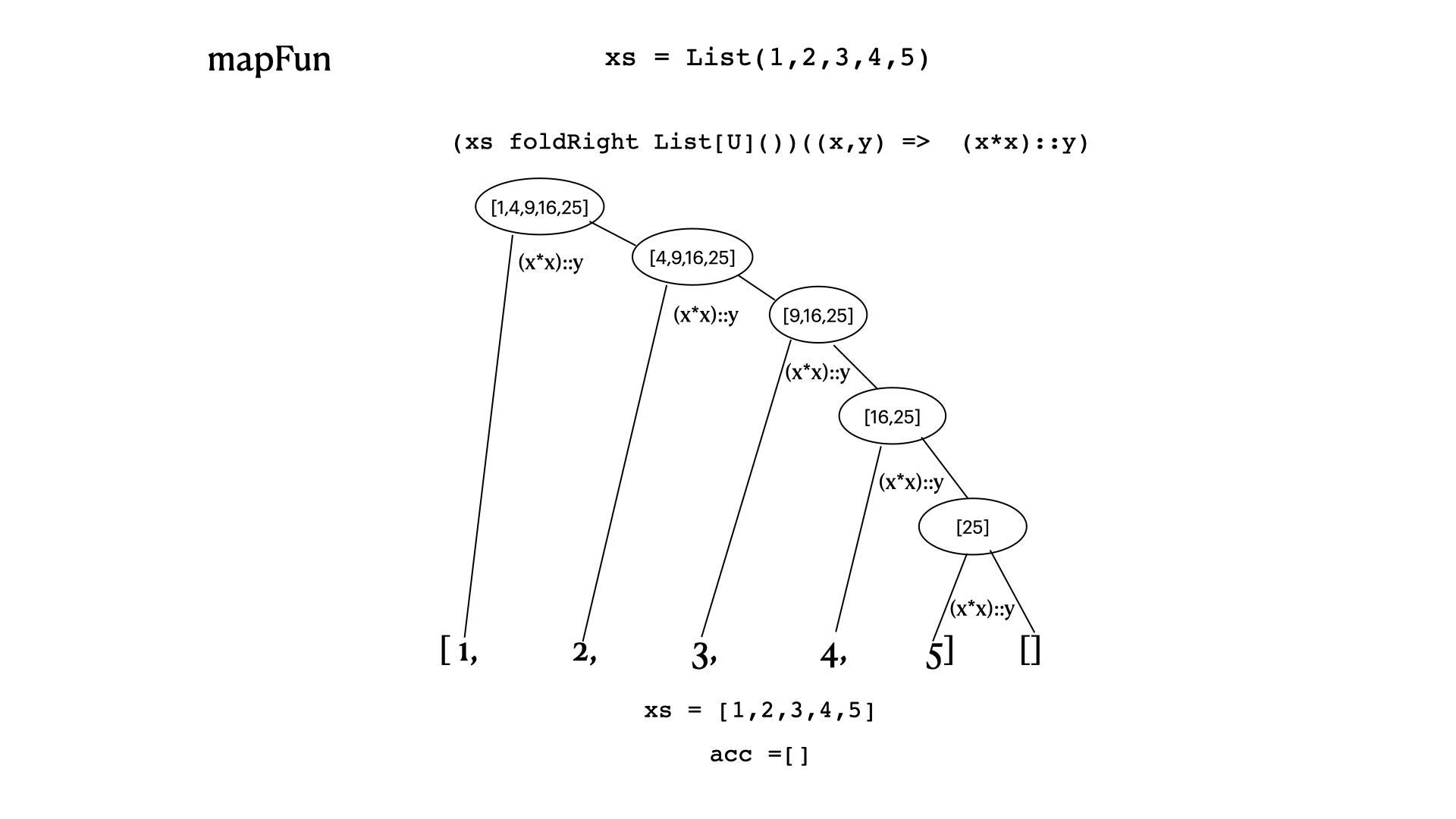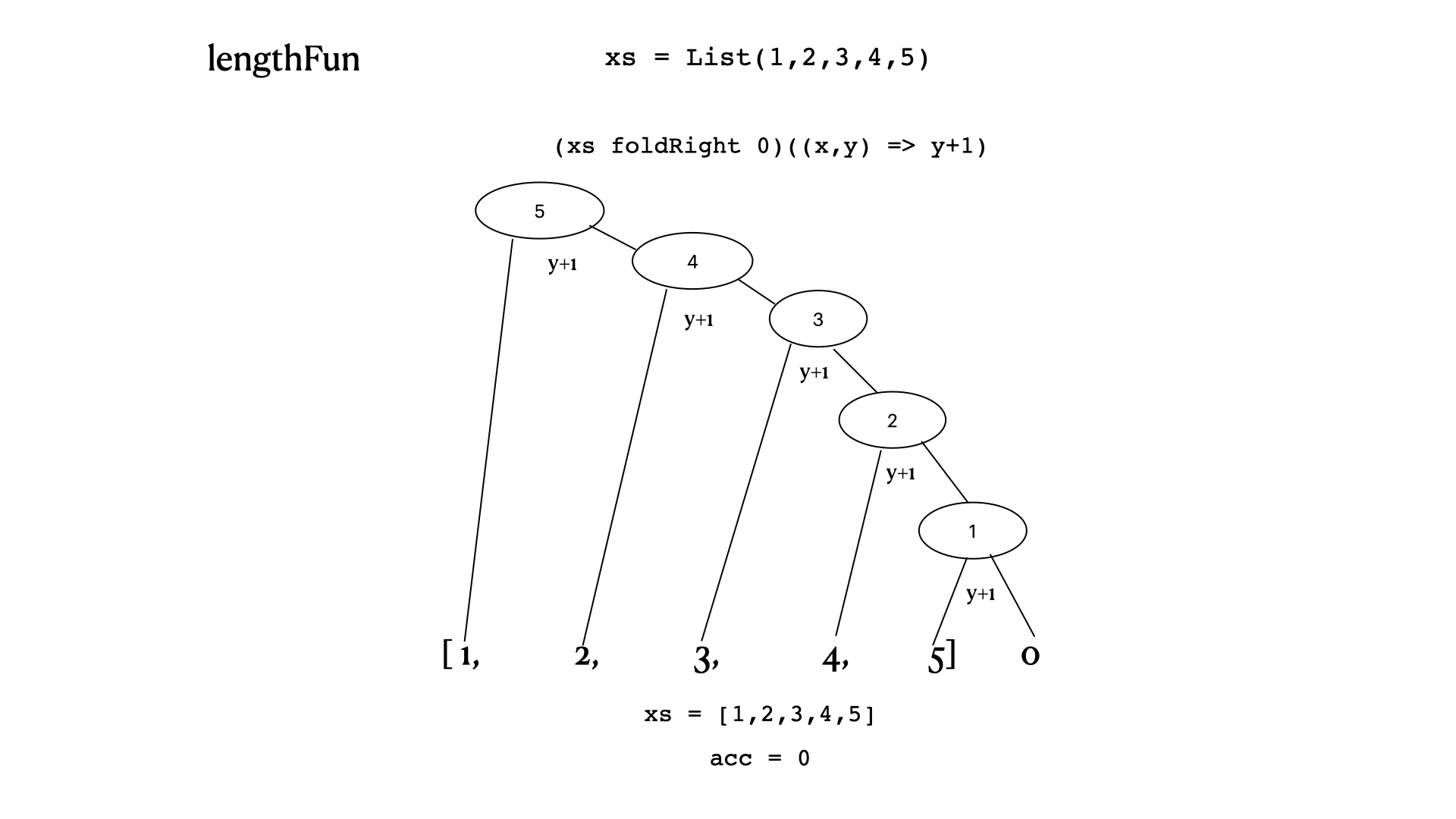Lists¶
List is a fundamental data structure in functional programming.
List(x1,…,xn)
Examples:
val fruits = List("apple","banana","orange","mango")
val numbers = List(10,20,30)
val empty = List()
val nestedList = List(List(1,2,3),List(4,5),List(5,6,7))
Lists are immutable
Lists are recursive (i.e. nested)
LISP-like list structure: (Linked List with car-cdr)
Lists are homogenous. i.e. elements are of same type.
Type of a list of elements of type T is scala.List[T] or just List[T]
e.g.
val fruit: List[String] = List("apple","mango")
val nestedList: List[List[Int]] =
List(List(1,2,3),List(4,5))
val empty: List[Nothing] = List()
List Constructor¶
All lists are constructed from empty list Nil
construction operation :: (pronounced cons)
x :: xs gives a new list with first element x, followed by elements
of list xs
e.g.
val fruit = "apple" :: ("orange" :: ("pear" :: Nil))
val nums = 1 :: (2 :: (3 :: (4 :: Nil)))
val empty = Nil
:: is right associative
A :: B :: C is interpreted as A :: (B :: C)
List Operations and Patterns¶
3 basic operations:
head - the first element of the list
tail - the list composed of all the elements except the first
isEmpty - true if list is empty, false otherwise
fruit.head == "apple"
fruit.tail.head == "orange"
empty.head ==
throw new NoSuchElementException("head of empty list")
List Patterns
Nil
p :: ps
List(p1,…,pn)
1 :: 2 :: xs denotes a list whose first 2 elements are 1 and 2 and the rest of the list is xs
x :: Nil denotes a singleton list whose element is x
List(1 :: 2 :: xs) is a list of one element, which is the list 1,2,...
What can you say about the length of x :: y :: List(xs,ys) :: zs ?
Answer: >= 3
Sorting a list (insertion sort)¶
def isort(xs: List[Int]): List[Int] = xs match {
case Nil => Nil
case y :: ys => insert(y, isort(ys))
}
def insert(x: Int, xs: List[Int]): List[Int] = xs match {
case Nil => x :: Nil
case y :: ys => if (x <= y) x :: xs else y :: insert(x, ys)
}
// Time Complexity: O(n^2)
isort(List(10,9,8,12,5,9))
Additional List Methods¶
| Method | Meaning |
|---|---|
xs.length |
size of xs |
xs.last |
last element of xs, exception if xs is empty |
xs.init |
A list of all but the last element, exception if xs is empty |
xs take n |
List of first n elements, or xs if list is shorter than n |
xs drop n |
List of last n elements, or xs if list is shorter than n |
xs(n) |
or written xs apply n, element at index n |
Creating new lists
| Method | Meaning |
|---|---|
xs ++ ys |
concatenation |
xs.reverse |
reverse |
xs updated (n,x) |
update index n with x |
Finding elements
| Method | Meaning |
|---|---|
xs indexOf x |
index of x, -1 if not found |
xs contains x |
same as (xs indexOf x) >= 0) |
val xs = List(1,2,3,4,5)
val ys = List(10,20,30)
xs.length
xs.last
xs.init
xs take 3
xs drop 2
xs(3)
xs apply 3
xs ++ ys
xs.reverse
xs updated (3,99)
xs indexOf 4
xs contains 4
xs contains 98
Implementation of first, last, init¶
// Note use of templated functions! parameter T
def first[T](xs: List[T]): T = xs match {
case Nil => throw new Exception("first of empty list")
case y :: ys => y
}
// Time complexity: O(1)
def last[T](xs: List[T]): T = xs match {
case Nil => throw new Exception("last of empty list")
case x :: Nil => x
case y :: z :: ys => last(z :: ys)
}
// Time complexity of last: O(n)
def init[T](xs: List[T]): List[T] = xs match {
case Nil => throw new Exception("init of empty list")
case x :: Nil => Nil
case y :: z :: ys => y :: init(z :: ys)
}
// Time complexity of last: O(n)
val xs = List(1,2,3,4,5)
first(xs)
last(xs)
init(xs)
Implementation of concat, reverse¶
def concat[T](xs: List[T], ys: List[T]): List[T] = xs match {
case Nil => ys
case z :: zs => z :: concat(zs,ys)
}
// Time complexity of last: O(|xs|)
def reverse[T](xs: List[T]): List[T] = xs match {
case Nil => Nil
case y :: ys => reverse(ys) ++ List(y)
}
// Time complexity of last: O(n^2)
// Can be improved to O(n)!
concat(xs,ys)
reverse(xs)
Exercises:
Remove the nth element in a list (if no nth element, return original list)
def removeAt[T](xs: List[T], n: Int): List[T] = ???
removeAt(List(1,2,3,4),2)
res3: List[Int] = List(1, 3, 4)Flatten a list structure
def flatten(xs: List[Any]): List[Any] = ???
flatten(List(List(1,2),3,List(4,5)))
res4: List[Any] = List(1, 2, 3, 4, 5)Mergesort¶
def merge(xs: List[Int], ys: List[Int]): List[Int] = xs match {
case Nil => ys
case x :: xt => ys match {
case Nil => xs
case y :: yt => if (x < y) x :: merge(xt,ys)
else y :: merge(xs,yt)
}
}
def mergesort(xs: List[Int]): List[Int] = {
val n = xs.length/2
if (n == 0) xs
else {
val (first,second) = xs splitAt n // Tuple Data Structure
merge2(mergesort(first), mergesort(second))
}
}
def merge2(xs: List[Int], ys: List[Int]): List[Int] = (xs,ys) match {
case (Nil,Nil) => Nil
case (Nil,y::yt) => ys
case (x::xt,Nil) => xs
case (x::xt,y::yt) => if (x < y) x::merge(xt,ys) else y::merge(xs,yt)
}
val ts = List(3,1,9,12,4)
mergesort(ts)
// Can also access tuple elements as t._1, t._2, etc.
Mergesort for lists of any type, List[T]¶
How to make mergesort more general?
def mergesort[T](xs: List[T]): List[T] = ???The previous version will not work because of the < comparison in merge.
Lets send comparison as a parameter into mergesort/merge.
def mergesort[T](xs: List[T])(lt: (T,T) => Boolean): List[T] = {
val n = xs.length/2
if (n == 0) xs
else {
def merge(xs: List[T], ys: List[T]): List[T] = (xs,ys) match {
case (Nil,Nil) => Nil
case (Nil,y::yt) => ys
case (x::xt,Nil) => xs
case (x::xt,y::yt) => if (lt(x,y)) x::merge(xt,ys) else y::merge(xs,yt)
}
val (first,second) = xs splitAt n
merge(mergesort(first)(lt), mergesort(second)(lt))
}
}
val xs = List(5,4,3,2)
val fruit = List("oranges","apples","bananas")
mergesort(xs)((x,y) => x < y)
mergesort(fruit)((x,y) => x.compareTo(y) < 0)
Higher Order Functions for Lists¶
Some patterns in list processing:
transform each element in a list in a particular way (map)
retrieve subset of elements from a list (filter)
combining elements of a list using an operator (reduce/fold)
Functional languages provide us higher-order functions to achieve these patterns
Map¶
// Consider the following function
def scaleList(xs: List[Double], factor: Double): List[Double] = xs match {
case Nil => Nil
case y :: ys => y*factor :: scaleList(ys,factor)
}
scaleList(List(2.3, 4.5, 6.0), 2)
Actually, Scala Lists have a predefined operator, map, that can do this:
List(2.3, 4.5, 6.0).map(x => 3*x)
The map function may be defined as follows: (SKIP!!)
abstract class List[T] {
…
def map[U](f: T=>U): List[U] = this match {
case Nil => this
case x :: xs => f(x) :: xs.map(f)
}
…
}
def squareList(xs: List[Int]): List[Int] = xs match {
case Nil => Nil
case y :: ys => y*y :: squareList(ys)
}
def squareList2(xs: List[Int]): List[Int] =
xs.map(x=>x*x)
squareList(List(1,3,6))
squareList2(List(1,3,6))
Filter¶
def posElements(xs: List[Int]): List[Int] = xs match {
case Nil => Nil
case y :: ys => if (y > 0) y :: posElements(ys) else posElements(ys)
}
posElements(List(-1,1,2,-3,5))
Actually, Scala Lists have a predefined operator, called filter:
List(-1,1,2,-3,5) filter (x => x > 0)
List(-1,1,2,-3,5) map (x => x > 0)
The filter function may be defined as follows: (SKIP!!)
abstract class List[T] {
…
def filter(p: T=>Boolean): List[T] = this match {
case Nil => this
case x :: xs => if (p(x)) x:: xs.filter(p)
else filter(p)
}
…
}
Variations of the filter operator
xs filterNot p
same as
xs filter (x => !p(x))
xs partition p
same as
(xs filter (x => p(x)), xs filterNot (x => p(x))
xs takeWhile p
longest prefix of xs such that the elements satisfy p
xs dropWhile p
remaining list after all leading elements satisfying p are dropped
xs span p
same as
(xs takenWhile (x => p(x)), xs dropWhile (x => p(x))
Using map to pack/encode¶
def pack[T](xs: List[T]): List[List[T]] = xs match {
case Nil => Nil
case y :: ys => pack(ys) match {
case Nil => List(List(y))
case z :: zs =>
if (z contains y) (y :: z) :: zs
else List(y) :: z :: zs
}
}
val xs = List("a","a","a","b","c","c","a")
// y = "a"
// ys = List("a","a","b","c","c","a")
// pack(ys) = List(List("a","a"),List("b"),List("c","c"),List("a"))
// z = List("a","a")
// zs = List(List("b"),List("c","c"),List("a"))
pack(xs)
def encode[T](xs: List[T]): List[(T,Int)] =
pack(xs).map(x => x match {case a::as => (a,(a::as).length)})
encode(List("a","a","a","b","c","c","a"))
encode(List())
Reduce¶
Combine elements in a list using a given operator.
sum(List(x1,…,xn)) = 0 + x1 + … + xn
product(List(x1,…,xn)) = 1 * x1 * …* xn
We could implement this using recursion as follows:
def sum(xs: List[Int]): Int = xs match {
case Nil => 0
case y :: ys => y + sum(ys)
}
sum(List(2,4,6,8))
But, Scala provides an operator, reduceLeft, to do this:
def sum(xs: List[Int]): Int =
(0 :: xs) reduceLeft ((x,y) => x + y)
def product(xs: List[Int]): Int =
(1 :: xs) reduceLeft ((x,y) => x * y)
sum(List(3,10,2,5))
product(List(3,10,2,5))

Shorter way to write anonymous functions:
(_*_) is the same as ((x,y) => (x * y))
Every _ represents a new parameter, going from left to right.
def sum(xs: List[Int]): Int =
(0 :: xs) reduceLeft (_+_)
def product(xs: List[Int]): Int =
(1 :: xs) reduceLeft (_*_)
sum(List(2,4,6,8))
product(List(2,4,6,8))
Fold¶
fold is similar to reduce, but takes an accumulator, x, as an additional parameter; the accumulator is returned when called with an empty list.
(List(x1,…,xn) foldLeft acc)(op) = (…(acc op x1) op … ) op xnSo, sum and product can be written as:
def sum(xs: List[Int]): Int =
(xs foldLeft 0)(_+_)
def product(xs: List[Int]): Int =
(xs foldLeft 1)(_*_)

reduceLeft and foldLeft may be implemented within List class as follows: SKIP!!
abstract class List[T] {…
def reduceLeft(op: (T,T)=>T): T = this match {
case Nil => throw new Error("Nil reduceLeft")
case x :: xs => (xs foldLeft x)(op)
}
def foldLeft[U](acc: U)(op: (U,T) => U): U = this match {
case Nil => acc
case x :: xs => (xs foldLeft op(acc,x))(op)
}
}
(5::Nil reduceLeft (_+_))
(5::Nil foldLeft 0) (_+_)
reduceRight and foldRight¶
List(x1,…,xn-1,xn) reduceRight op =
x1 op (x2 op (…(xn-1 op xn)…)
(List(x1,…,xn) foldRight acc)(op) =
x1 op (…(xn op acc)…)
reduceRight and foldRight may be implemented within List class as follows: SKIP!!
abstract class List[T] {…
def reduceLeft(op: (T,T)=>T): T = this match {
case Nil => throw new Error("Nil reduceRight")
case x :: Nil => x
case x :: xs => op(x, xs reduceRight(op))
}
def foldRight[U](z: U)(op: (U,T) => U): U = this match {
case Nil => z
case x :: xs => op(x, (xs foldRight z)(op))
}
}
For operators that are associative and commutative, foldLeft and foldRight are equivalent. But is some cases one is more appropriate than the other.
e.g.
def concat[T](xs: List[T], ys: List[T]): List[T] =
(xs foldRight ys)(_ :: _)
reverse, mapFun, lengthFun¶
def reverse[T](xs: List[T]): List[T] =
(xs foldLeft List[T]())((ys, y) => y :: ys )
// Time Complexity O(n)
reverse(List(1,2,3,4,5))

def mapFun[T,U](xs: List[T], f: T => U): List[U] =
(xs foldRight List[U]())((x, y) => f(x)::y)
mapFun(List(1,2,3,4,5), (x => x * x): Int =>Int )

def lengthFun[T](xs: List[T]): Int =
(xs foldRight 0)((x, y) => y+1)
lengthFun(List(1,2,3,4,5))
